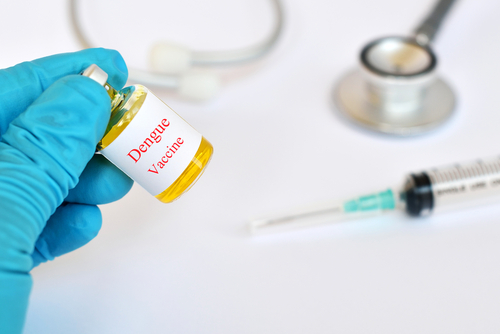Dengvaxia, a live recombinant tetravalent dengue vaccine developed by Sanofi Pasteur
UNI Dec 05, 2017
There continues to be a strong public health need for effective preventive interventions against dengue, a disease caused by four viruses, termed serotypes 1-4.

One dengue vaccine has been licensed, Dengvaxia (also referred to as CYD-TDV), developed by Sanofi Pasteur. Dengvaxia is a live recombinant tetravalent dengue vaccine developed by Sanofi Pasteur, given as a 3-dose series on a 0/6/12 month schedule. Dengvaxia is the first dengue vaccine to be licensed and has now been approved by 19 regulatory authorities for use in endemic areas in persons typically ranging from 9-45 (in some countries 9-60) years of age. It has been introduced in two subnational programs in the Philippines and Brazil targeting about one million individuals. It is otherwise available on the private market in countries where there is a marketing authorization.
Dengvaxia has been evaluated in two Phase 3 clinical trials (CYD14 trial in five countries in Asia and CYD15 trial in five countries in Latin America). Together, these trials included over 30,000 participants aged 2 to 16 years. Vaccine efficacy against confirmed dengue pooled across both trials was 59.2 per cent in the year following the primary series, and 79.1 per cent against severe dengue. Efficacy varied by serotype, by age at vaccination and serostatus at baseline (i.e., previous exposure to dengue prior to vaccination).
While efficacy was reported against hospitalized and severe dengue in Years 1 and 2 post-dose 1, an excess of cases of hospitalized and severe dengue cases in those receiving Dengvaxia was seen in Year 3 in some subgroups, although it is based on relatively small numbers of cases. Whether the increased risk was due to age or serostatus at baseline, which is highly correlated with age, could not be fully clarified with the available data at the time. For subjects aged 9 and above, in the first 25 months of the phase 3 trials, there was a reduction in severe dengue by 93 per cent and a reduction in hospitalizations by 81 per cent.
-
Exclusive Write-ups & Webinars by KOLs
-
Daily Quiz by specialty
-
Paid Market Research Surveys
-
Case discussions, News & Journals' summaries